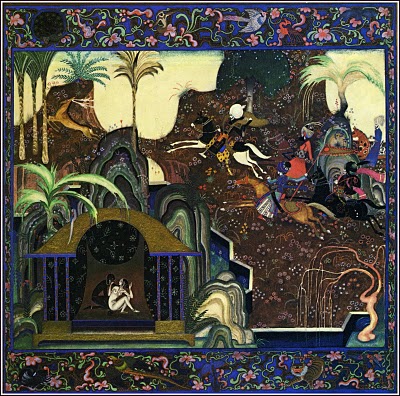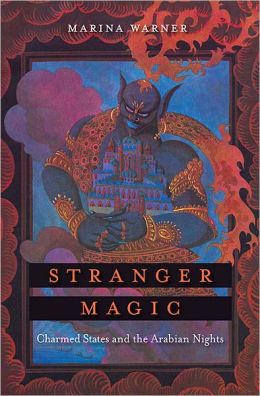In the frame story of the Arabian Nights, Scheherezade must attempt to save her life by storytelling to end the cycle of Shahriyar's killing a new wife every night. Though Shahriyar's character is similar to Bluebeard, the serial killing husband, Bluebeard has no given reason for his killing spree. Yet Shahriyar has a history which makes him a little more sympathetic. He had found his Sultana and her maids cavorting with slaves and decided to take out his vengeance on the female race. Not only that, but his brother Shahzenan had also caught his wife cheating with a slave.
Shahriyar does have reason, then, to be doubtful of the fidelity of women, just as anyone who has been betrayed will find it hard to trust again (although his actions are obviously not justified). Therefore, when Sheherezade is telling her stories, she is not only adding one more day to her own life, but attempting to "clear this anger and remove the rationale for the men's hatred."
The stories contain all sorts of female characters, as a well-rounded collection of tales should (i.e., not all passive women who sit and wait to be rescued as is the traditional stereotype; but not also only sword-weilding athletic warriors as is becoming the only way to portray females in our very gender sensitive society). Some of the characters even appear to enforce negative female stereotypes.
Yet throughout the Nights there is a message of vindication for the female sex. First of all is Scheherezade herself. Not only was she bold enough to request that she be made the Sultan's new bride, but despite her father the Vizier's warning her against it, she holds her own and insists. Unheard of for the culture from which these stories came! A woman defies her father's will and goes on to redeem a Sultan, save her own life and countless others who would have come after her.
Scheherezade tells tales from the female side of view as well-those featuring "maltreated wives, subjugated daughters, faithful female lovers, clever and courageous slave girls, courageous loving mothers, intelligent teachers, loyal sisters and devotes peris or fairies in an increasingly shining procession of women: refracting the virtues of the storyteller herself and her audience-but not so undilutedly or obviously that her purpose shows too much." I think that last part is key, because so many fairy tales have become most famous in versions that are overly preachy and can get tiresome.
In the end Scheherezade's goal is to heal Shahriyar and show him a world of possibilities outside of those in his negative experiences. Earlier tales in the collection are more cynical, but they progress "towards a politics of love and justice that opens the cruel Sultan's eyes to another vision of humanity and to his responsibilities as a ruler."
I believe that the stories and entertainment with which we feed ourselves can and do shape who we are; we can be inspired or jaded, our eyes opened to new ways of thinking and experiences beyond our own. Marina Warner reminds us that the Nights are essentially stories about the power of stories-the suspense they create are literally Scheherezade's only hope for survival. The same stories that served to entertain a murderous Sultan have fascinated the world for hundreds of years and have influenced culture in ways we don't even realize.
All information and quotes were taken from the introduction to Marina Warner's Stranger Magic: Charmed States and the Arabian Nights. 400+ pages on the Arabian Nights, a realm of the fairy tale world it's very difficult to find much information on! Expect more posts from this book throughout the year as I find snatches of time to read...
Illustrations of Bluebeard and Arabian Nights by Kay Nielsen (cover art for the book is by Errol Le Cain)





I can't wait for more posts on Arabian Nights! I've always been a little bit in awe of Scheherezade and her storytelling power :)
ReplyDeleteWonderful! and what a great way to explore female agency and power in fairy tales. I'm due for a reading of some Arabian Nights- any good tales I shouldn't miss?
ReplyDeleteYou hit on the nerve of why I love Nights.
ReplyDeleteI recently read a good YA novel touching on the same things, Shadow Spinners, about Scheherazade and the rest.